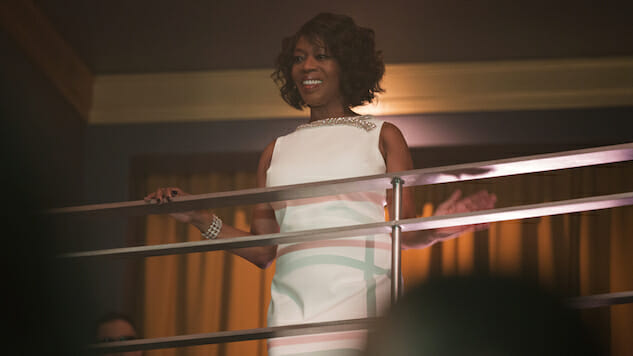How Luke Cage‘s Alfre Woodard Became the Most Interesting Antagonist on TV
Photo: Cara Howe/Netflix TV Features Luke Cage
In “You Know My Steez,” the Season One finale of Marvel’s Luke Cage, Harlem councilwoman Mariah Dillard (Alfre Woodard) is brought in for questioning in the murder of her cousin, club owner/underworld kingpin Cornell “Cottonmouth” Stokes (Mahershala Ali). When we first see her across the interrogation room’s table, the face of the “New Harlem Renaissance” is streaked with tears; she speaks softly, hoarsely, almost batting her downcast eyes. She plays innocent, misnaming Willis “Diamondback” Stryker (Erik LaRay Harvey) — with whom she’s conspired to loosen Cottonmouth’s grip on the neighborhood — “Diamond Jim,” and then shifts, pressing down on her internal accelerator, into near-hysterics. “That big brother who was fightin’ Luke Cage up on Malcolm X, he pulled a gun on me and said that if I didn’t say it was Luke Cage, he was gonna kill me!” she cries, clutching her neck with one hand and shaping a pistol with the other. Suddenly, she pumps the brakes: a gesture at repentance, an offer to help. Finally, tenacious, hotheaded Det. Misty Knight (Simone Missick) enters the room and accuses Dillard of lying—and plays the audio recording with which she plans to prove it. “Go to trial with that flimsy-ass shit, I dare you,” the councilwoman retorts, Woodard slipping into rougher language as she completes the first season’s finest coup. “I double damn dare you, trick!”
Anchored by Woodard’s virtuosic turn—a one-woman orchestra of vocal registers, facial expressions, postures, and movements, always in harmony or purposeful dissonance—Dillard has emerged as the linchpin of what series creator Cheo Hodari Coker calls “the superhero show no one’s talking about, but should be.”
“As flashy and as cool as Bushmaster is,” Coker tells Paste, referring to Cage’s new adversary, a Jamaican heavy with his sights on Harlem, “Mariah Dillard—Stokes—is the true ‘Big Bad’ of Season Two… We wanted to create a dynamic character who was scary without superpowers. Bushmaster’s the physical threat, but the emotional threat is Mariah.”
Even considered separately from Mike Colter’s bulletproof hero or Mustafa Shakir’s merciless challenger, Dillard’s arc in the first two seasons of Luke Cage—from unscrupulous politician protective of her community to “Big Bad” protective mainly of herself—is as compelling as any antagonist on television, in part because Coker and co. lean into her descent. Though it happens by increments, there’s no confusing Mariah Dillard for an anti-heroine: Woodard’s blistering performance, suggesting at once a figure of real fragility and an emotional manipulator of the first order, ensures that the character defies easy categorization. Not that the actress admits to any such difficulty—for her, the point is that Mariah Dillard is the heroine of her own story.
“If you know how to take care of business, you want to be in charge,” Woodard says with a wink, channeling Dillard’s evolving understanding of “politics” before my eyes. “You don’t want to have a democratic situation, because everybody doesn’t need a say, or a vote. That’s how we get into trouble. You should let the capable people take care of things.” As she does in the series so adroitly, Woodard pauses here, shifting gears: “I think she really believes that,” she continues. “And Lord knows, I get impatient in a situation where you have to sit in a meeting and hear people give their little crazy ideas. But you have to be nice and go, ‘Uh huh, well, OK, what about you, Gail?’” With one final flourish and a mischievous laugh, she pounds the table. “It’s like, ‘You know what? I know how to fix this, damnit!’”
It’s Woodard’s willingness to get under Dillard’s skin that enlivens the character, transforming the sort of craven pol familiar from House of Cards (or, frankly, Congress) into a human cannonball. Her detonations are delicious: In the season premiere, when a waiter refers to her as the “aunt” of much younger paramour “Shades” Alvarez (Theo Rossi), she coos at her “nephew” while sucking his thumb; in the second episode, she shrieks at an unexpected hurdle as if in physical pain. In fairness, though, Woodard has a rich vein of material to work with, especially after last season’s flashbacks to the Stokes crime syndicate’s frightening matriarch, Mama Mabel—through which we come to see that she, as with many of the most mesmerizing villains (real and imagined) has been on the receiving end of evil, too.
“The thing with Alfre Woodard, the thing with Mariah Dillard, is—it’s just like the line she says in [the season premiere]: ‘I’ve been a Dillard for a number of years, but I’m haunted by being a Stokes,’” Coker says, comparing her Season Two arc to Clint Eastwood’s unforgettable William Munny, in the Western classic Unforgiven. “When we created Mama Mabel Stokes, who didn’t exist in the comic books, as a way of helping us understand how Cottonmouth became Cottonmouth, we also see how that affected Cottonmouth’s cousin, Mariah. And how she’s haunted by that kind of evil, and how she fights and fights against that evil inside until she finally relents. The moment that Mariah Dillard becomes Mariah Stokes, it’s this culmination of, ‘You wanted to see the villain? Now you see the villain.’”
See, hear, feel, even fear: In Coker and Woodard’s hands, Mariah Dillard is the antagonist no one’s talking about, but should be. And not for long.
Season Two of Luke Cage is now streaming on Netflix. Read our review here.
Matt Brennan is the TV editor of Paste Magazine. He tweets about what he’s watching @thefilmgoer.